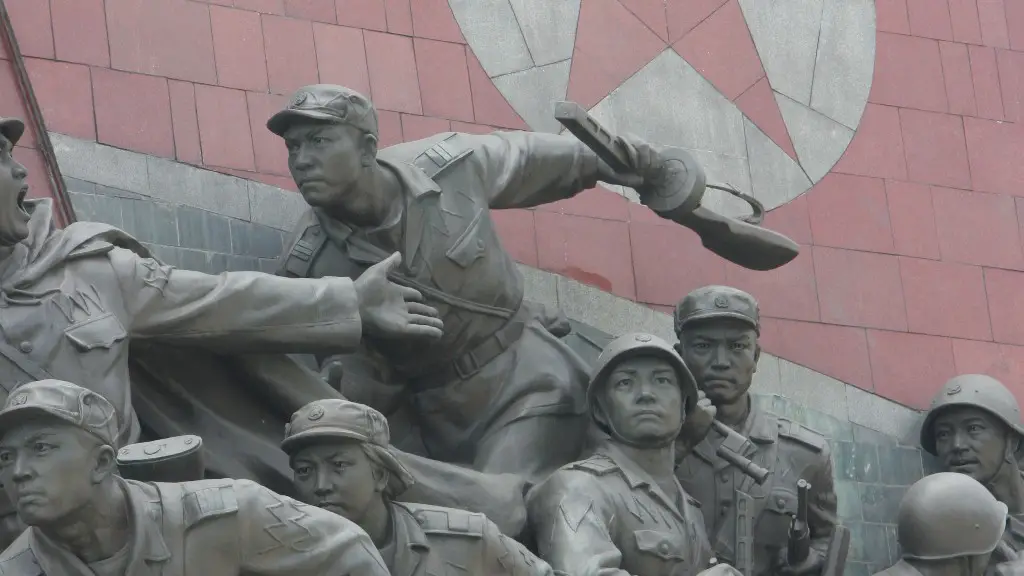North Korea’s History with America
For decades, North Korea and America have been enemies, with North Korean leadership claiming that America is its greatest threat. The hostile anti-American stance began in the 1950s during the Korean War, when US forces supported South Korea and fought against North Korea. Today, the US still has soldiers in South Korea as a deterrent to North Korean aggression, and this US presence is one of the primary reasons behind North Korea’s hatred for the US.
The US and North Korea have clashed multiple times since the Korean War, including in 1998 when North Korea tested its first long-range ballistic missile. Since then, tensions between the nations have only increased, with North Korea’s antagonistic actions, such as launching multiple missiles into the Sea of Japan, only fueling the animosity between the two countries.
North Korea’s relationship with the US has been further strained by its nuclear weapons program, which it has pursued despite international opposition. The US and other nations have imposed economic sanctions on North Korea in an effort to halt its nuclear program, but North Korea has refused to yield, citing the threat of a US invasion and regime change as the primary motivating factor behind its pursuit of nuclear weapons.
Why North Korea Hates America
There are a variety of reasons why North Korea despises America. Firstly, as mentioned above, North Korea views the US presence in South Korea as a threat and an effort to encroach on its sovereignty. North Korea is also fearful of US economic sanctions and the economic pressure it puts on the country.
Furthermore, North Korea views US foreign policy as a hostile attempt to contain and control its government. North Korea has accused the US of seeking to undermine its rule and mount efforts to destabilise the Kim dynasty. This suspicion is often heightened by US military exercises conducted in the region and what North Korea perceives as US attempts to interfere in its internal affairs.
Finally, North Korea is deeply suspicious of US motivations and ambitions in the region, particularly how the US intends to use its superpower status to influence international relations and its own standing in the region. North Korea believes that US policy is primarily driven by its own interests, rather than the security and well-being of other nations.
North Korea’s Perception of America
North Korea’s leadership views the US as an abusive superpower that only seeks to further its own interests and deny other nations the chance to exist independently. North Korea’s state-controlled media frequently accuses the US of pursuing hegemonic policies and attempting to bring about regime change in North Korea. The US is also perceived as a threat to North Korea’s security, with its presence on the Korean Peninsula being viewed as a precursor to war.
North Koreans have been raised in an environment that has fed them hostile propaganda against the US. This propaganda has been pervasive in North Korea for decades, with its citizens taught to treat the US with suspicion and scorn. As a result, the deep-seated anti-US sentiment that exists in North Korea is unlikely to dissipate anytime soon.
North Korea’s Anti-American Actions
North Korea’s leadership has repeatedly taken hostile actions against the US in an attempt to send a message and assert its own autonomy. North Korea has test-fired numerous missiles, conducted nuclear tests, and made threats of violence, all in the name of demonstrating its defiance of the US and its unwillingness to bow to its demands.
North Korea has also orchestrated cyber-attacks on US and South Korean institutions, including a devastating 2014 attack on Sony Pictures. This attack was in response to Sony’s release of a comedy film that mocked the North Korean regime.
Additionally, North Korea has resorted to abducting US citizens for use as political pawns. This strategy was used in the1970s and 1980s to demonstrate North Korea’s power, when it kidnapped a dozen Japanese and Korean-Americans for use as bargaining chips.
North Korea’s Goals towards America
North Korea’s ultimate goal is to gain recognition and respect from the US, and it hopes to achieve this by demonstrating its military and nuclear capabilities. North Korea is also seeking military guarantees from the US, as well as economic and diplomatic recognition. However, North Korea’s ultimate goal may be regime survival, as it sees a hostile and unpredictable US as its greatest threat.
North Korea views nuclear weapons not only as a deterrent but also as a means to gain international respect. North Korean officials have repeatedly argued that nuclear weapons will enable it to dictate terms to the US, and provide a guarantee of the Kim dynasty’s rule.
International Reactions
The international community has long been opposed to North Korea’s hostile actions towards the US. International condemnation has been widespread, with the UN and other international organisations repeatedly condemning North Korea’s actions. The US and its allies have also imposed numerous economic and diplomatic sanctions in an attempt to contain North Korea’s nuclear ambitions and hostile actions.
Some international observers have argued that greater diplomacy and engagement with North Korea would be more effective than sanctions and isolation. However, the US and other countries, such as South Korea, are unlikely to accept North Korea’s claims of being a legitimate nuclear power.
Implications of North Korea’s Hostility towards America
North Korea’s hostility towards the US has serious implications, both for North Korea and for the rest of the world. North Korea is likely to remain isolated and subject to economic sanctions for the foreseeable future, with any hope of Western engagement unlikely as long as it continues its hostile stance towards the US.
Moreover, the US is unlikely to relent on its stance towards North Korea, particularly with the Trump administration’s hardline stance on North Korea. This could lead to further tensions between the two countries and possibly even open hostilities, a situation that no one wants.
Finally, North Korea’s belligerence serves as a lesson to other nations that hostile actions against the US will be met with firm resistance. The US is unlikely to compromise on its security interests, and North Korea’s example serves as a stark warning that challenging the US can lead to dire consequences.




